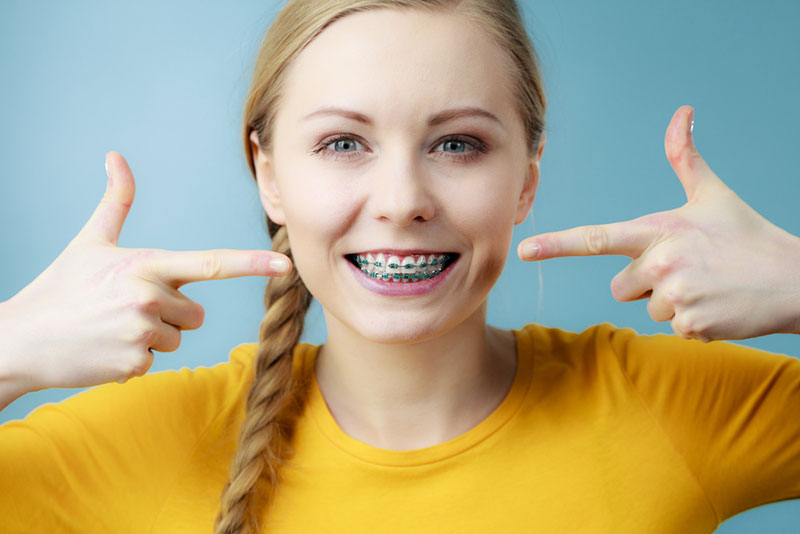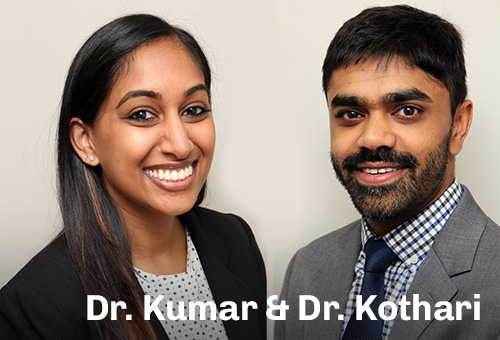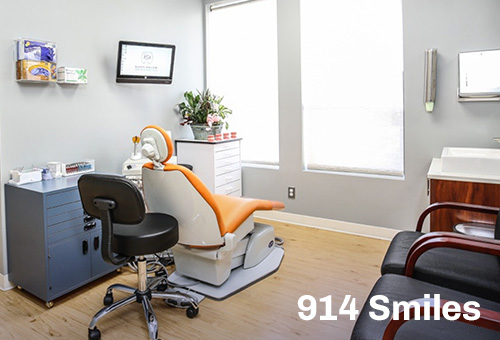
When you tell people you’re about to get braces, you’ll hear plenty of stories from friends and families about their own teeth-straightening journeys. It’s human nature to want to share but the occasional horror story should be taken with a grain of salt. Today’s braces are smaller, more streamlined and way more comfortable than they were in the past and many of the problems that used to plague braces wearers aren’t a concern anymore. At 914 Orthodontics, we use ultra-light, slim brackets and wires, making for an even better experience. However, there is an acclimation period in the beginning and the first week with braces can come with some challenges while you get used to them (and a few unexpected perks!). We’re here to help! Dr. Kothari has perfected thousands of smile with Invisalign and braces in Tarrytown, Sleepy Hollow, Briarcliff, Ossining and the surrounding areas and even had braces himself when he was younger. He has the inside scoop on everything you can expect when you get braces on. Here are the things you’ll need to know to navigate the early days of treatment, as well as some tips for the first week of braces:
First Week With Braces
1. You’ll Get Asked Questions
It might come as a surprise but once you’re rocking braces, you suddenly get pegged as an expert. People are curious, especially if they’re unhappy with their smile and considering orthodontic treatment for themselves. Your friends who have yet to start treatment might ask things like: How much do braces cost? Who’s your orthodontist? How long will you have to wear them? Do braces hurt?
2. You’ll Have Smiles on the Brain
Starting orthodontic treatment is a big step and because you’ll be so involved with your own smile, particularly in the beginning, you’ll start to notice everyone else’s. Once you’re an old hand at having braces, this will subside but don’t be alarmed if you develop a bit of a smile obsession for a few weeks.
3. New Friends are a Possibility
You’ll feel a connection to other braces wearers because you’re all going through the same thing. It’s kind of like when you get a dog, you’re drawn to other dog owners. You have something in common. It’s actually fun. So, go ahead, give that classmate in braces a knowing nod.
4. Your Braces Will be More Under the Radar Than You Think
As noted, some people will ask questions about your orthodontic treatment and while during your first week with braces, it will feel like they’re really noticeable, aside from the curious few, you’ll be shocked that the majority of people won’t register them. That even goes for metal braces. They’re small and so commonplace that they’re far less visible than you might imagine. If you had fears of being the center of attention or being made fun of, this will be a relief. If you’re the opposite and you were hoping to make a splash, ask us about adding colorful elastics to your brackets for a bolder look.
5.It Might Feel Like Your Face and Mouth Look Different
When it comes to what to expect in your first week with braces, this is a big one. Having brackets and wires in your mouth is new and it takes time to become accustomed to them. Initially, you may feel like you look totally different and your lips are sticking out more or your face has changed but a lot of it is just from the unique sensation. We promise, you still look like you.
6. It’s Normal to Talk Funny
As we said, you have to get used to having braces in your mouth. At first, it can feel as if you have a bit of a lisp or you’re talking differently. Your speech will typically return to normal within a few days. This actually happens when you start Invisalign treatment too. One of the best tips for the first week of braces is to talk as much as possible. Read aloud, chat on the phone with friends and sing along to your favorite songs. The more you talk with braces, the faster you’ll adjust.
7. Your Teeth can be Sensitive
Before they start treatment, patients sometimes want to know how long do braces hurt after you get them? The answer is, they shouldn’t hurt! Braces aren’t painful. If you feel serious pain, call us right away. Instead, most patients have some sensitivity and mild aching in their teeth and jaws that starts the first day with braces, usually a few hours after you get them put on. You might also have sensitivity following adjustments. It’s minor and goes away quickly. Any discomfort can be managed by taking an over-the-counter pain reliever, like Tylenol, and eating soft foods, which brings us to our next point.
8. Soft Foods and Cold Drinks Will be Your Friends
In order to really let the special adhesive we use to bond the brackets to your teeth set, stick with soft foods for the rest of the day after you get your braces on. This will also help manage sensitivity. It’s the perfect excuse to have a milkshake! Another of our tips for braces is to go food shopping before your bonding appointment and stock up on things like mashed potatoes, yogurt, soup and ingredients for smoothies. You might also want to drink ice water to help numb any discomfort. After that first day with braces what to eat will be a matter of what you’re ready to take on. Most patients resume their normal diet the following day. There will be foods you’ll need to avoid like anything really hard (chips, nuts, whole, raw apples and carrots, hard taco shells), chewy (hard bagels and rolls), sticky (caramel, taffy, Starburst) or that can get stuck in your braces and cause inflammation (popcorn). Make all foods as easy to eat as possible by cutting or breaking everything into bite-sized pieces and don’t bite into things with your front teeth.
9. Braces are Food Magnets
Food gets caught in braces. It’s unavoidable! That’s why brushing after every meal is important to prevent cavities (and embarrassing situations). In addition to a travel toothbrush and toothpaste, pack a compact mirror and travel interproximal brushes with you when you leave the house, so you can check your braces after eating and dislodge any food that gets stuck in your brackets and wires.
10. Oral Hygiene is a Top Priority
Brushing and flossing with braces can feel challenging at first. You’ll be a pro in no time. Because your hardware will trap food and it takes a little while to learn to brush and floss properly (we’ll show you how), you are at a higher risk for cavities. Make oral hygiene a main priority when you’re wearing braces. Visit your general dentist regularly and floss at least once a day using an orthodontic flosser or a floss threader with regular dental floss. Brush after every meal. If you forget your toothbrush at home, rinse your mouth out really well with water after eating and be sure to brush when you have access to it again. We’ll let you know if you should add a fluoride rinse to the mix.
11. Your Lips and Cheeks Need Time to Toughen Up
It’s normal to experience irritation on the inside of your lips and cheeks from your brackets and wires. The soft tissues in your mouth get tougher and over the course of the first few weeks, the hardware will no longer bother you. Mouth sores from braces aren’t actually caused by the braces. Some people are susceptible to them and the braces may exacerbate the sores. To combat irritation and mouth sores from braces, make a saltwater rinse by dissolving ½ teaspoon of salt in a glass of warm water. Swish this around in your mouth and then spit it out. Repeat as needed. For mouth sores, apply a small amount of topical anesthetic, such as Orabase or OraJel, to a Q-tip and gently swab it on the sore. To prevent irritation, warm a small piece of orthodontic wax between your fingers and cover the bothersome parts of the braces.
12. Your Mouth Can Get Dry
Some patients experience dry mouth with braces. This can be because prior to treatment, they were chewing gum all day or eating and drinking a lot, all of which stimulate saliva. Now that they’re not, their mouth feels dry. To remedy the situation, stay hydrated and sip on water frequently. Instead of chewing on gum, suck on sugar-free hard candies (never bite them!). If the problem continues, it may not be braces-related dry mouth and could be due to another condition, so let your doctor know.
13. You Might Have to Relearn Things
When you suddenly have an appliance in your mouth, things can feel weird. You’ll have to learn new techniques for brushing, flossing and chewing. If you play a wind instrument, you’ll also have to adjust to playing with hardware on your teeth. You won’t necessarily have to learn it all over again but during your first week with braces, it might feel odd.
Your first week with braces is an exciting time. It means you’re on way to having a brand new smile. You’ll get used to having braces and soon, you’ll forget you’re wearing them. Be patient with yourself and don’t hesitate to reach out if you have any questions. If you’re ready to kick off your teeth-straightening journey, book a free consultation with our Sleepy Hollow, NY orthodontist, Dr. Kothari, today! Schedule online or by calling us at (914) 332-0900.



